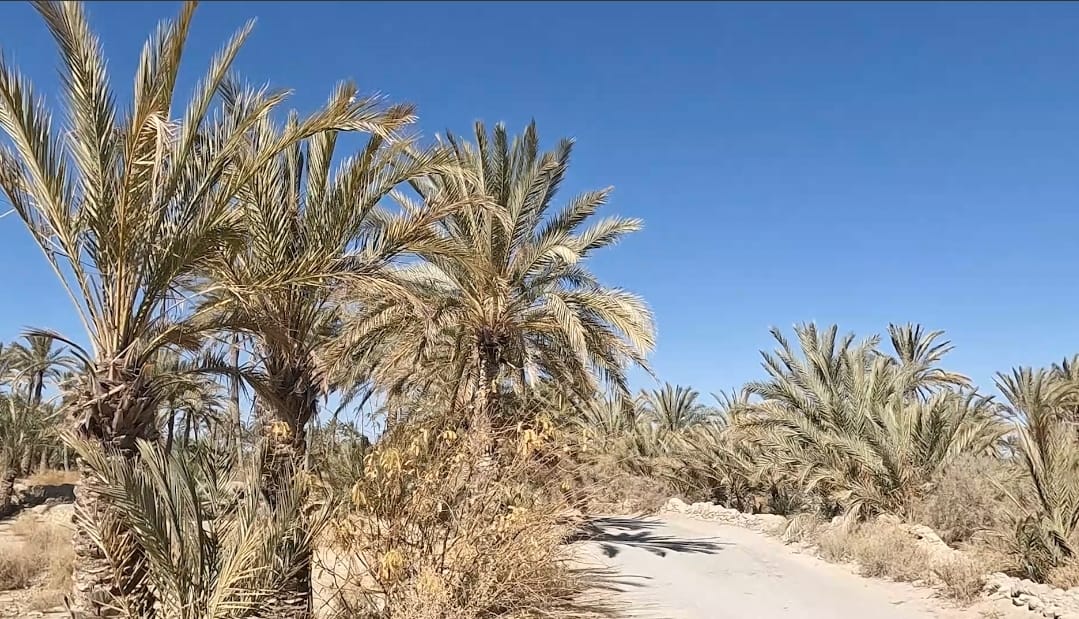
Panjgur: The city of Panjgur, located near the Iran border, is surrounded by date palms and is known for its warm weather, hotter than most parts of the province. The main sources of income here are informal cross-border trade and date farming. However, in recent years, Balochistan has experienced extreme rainfall and flash floods. Climate change is now severely affecting the region’s date farms, causing crop damage, water scarcity and disrupted rainfall patterns.
Muhammad Ilyas, a local farmer, owns a small date palm farming is his only source of income. “There is a serious shortage of water for the date palms,” he says. “We have no agricultural support or facilities. We use more energy working in the date fields because we don’t have machines.” Ilyas explains that varieties like Mozati and Janshor are delicate and easily damaged by rain. “This year, heavy rainfall ruined our Mozati and Janshor dates,” he added.
Panjgur is a conflict-hit district, internet service has been suspended for years due to security concerns.
According to the Agriculture Department, Panjgur alone has date palms spread across 160,000 acres, producing dates worth around 12 billion rupees annually.The Climate Risk Index (CRI) 2025 by Germanwatch, released in February, shows that Pakistan is among the countries most frequently affected by climate change. It highlights that nations like Pakistan, India, and the Philippines face ongoing climate-related hazards, not just isolated events.
Panjgur has only one date processing plant. Muhammad Yaseen, the plant manager, says they purchase dates from farmers, process them, and distribute them to cities across Pakistan. “We turn some types of dates into paste, while others are exported to different countries,” he said. Popular date varieties in Panjgur include Muzafati, Janshor Rabi, Sharifa, Barni, and Alina. Ilyas believes that if the government provides internet access and proper infrastructure, they could connect with international markets more easily, he added. Panjgur is a conflict-hit district, internet service has been suspended for years due to security concerns.
The Provincial Disaster Management Authority (PDMA) reports that climate change is worsening Balochistan’s environmental challenges. Rising temperatures are increasing evaporation rates, further reducing already limited water supplies. Agriculture—a key livelihood in the province—is at risk, with both crops and livestock suffering from heat stress and lack of water. Irregular and decreasing rainfall is also leading to longer droughts, putting food security and sustainable farming in danger.
Masood Ahmed Baloch, Director General of Agriculture, says the government has started a project to support local farmers by setting up the processing plant. “Balochistan is facing serious climate change effects. We are spreading awareness on how to save crops and manage water during heavy rains,” he said. He added that the plant will help connect local traders with European and Central Asian markets where the demand for dates is high.Member of the National Assembly, Pullain Baloch, who represents the Panjgur-Turbat constituency, says Panjgur is one of the most underdeveloped districts in Balochistan. “The people here are poor and depend on agriculture, but water scarcity and lack of resources are damaging their livelihoods,” he said.
“I have raised these concerns with the federal government, but no action has been taken so far,” he added. “We urge the provincial and federal governments to protect our date palms, take immediate steps, provide electricity, solve the water crisis, and adopt an effective climate policy.”






